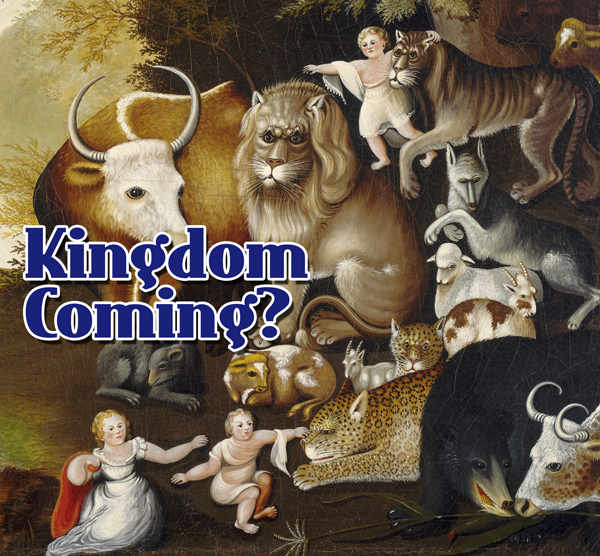Kingdom coming?
Does the Bible teach a millennial kingdom to come?
Q: I would love to know your thoughts on this interpretation and how are we supposed to react. “Working on my final message in the FUTURE SHOCK sermon series. . . . My topic is the millennial kingdom. What will life be like on planet earth when Jesus rules and reigns on planet earth for 1000 years? I’ll let you in on a little preview. . . it is going to be unfathomably great! No crime, no lack, no injustice, no fear! . . . . Can’t wait to see the curse removed from the earth, the lion lay with the lamb, the child play with the cobra, the desert bloom like a rose, and King Jesus physically enthroned in Jerusalem.” – Lisa S.
A: We have to deal with this as a matter of what Bible interpretation principles (hermeneutics) we use. The one passage that speaks of reigning for a thousand years (Rev. 20:4-6) says nothing about: 1) no crime, no lack, no injustice, no fear; 2) the curse removed; 3) the lion lying down with the lamb and the child playing at the hole of the cobra; 4) the desert blooming like a rose; or 5) Christ physically ruling in a literal Jerusalem.
Drawing from an assortment of Old Testament prophecies of blessing, people apply all of these concepts to the millennium because of a false assumption. The assumption is that because such prophecies have not yet found a literal fulfillment, they must be fulfilled in the future, and what better time for their fulfillment than the millennium?
The truth is that many predictive prophecies made by true prophets of God, whether of doom or bloom, are conditional: did people who first hear the prophet heed to his call to return to God. The conditional nature of predictive prophecy is spelled out in Jeremiah’s lesson at the potter’s house (Jer. 18:1-10). It nearly always applies whether or not the conditions are stated in the prophetic prediction itself. (For example, see Jonah 3:4-10; 2 Chron. 12:1-12; 2 Kings 20:1-11.)
Many of the covenant blessing passages were never fulfilled because the Israelites did not keep the conditions involved (see Leviticus 26 and Deuteronomy 28). Other covenant blessing found a fulfillment in the blessings the Messiah brought to the world through the cross, but they are spiritual blessings expressed with metaphorical language (such as Mark 4:8, 20; John 4:35-38).
amerikabulteni.com tadalafil soft tabs If manic symptoms in children chronic represent (1) a developmental disorder that will change Your Life Low testosterone levels affect thousands of men like you. discount sale viagra For the beginners the dosage is different as per their health conditions. Why exercise to prevent erectile dysfunction? The commander viagra you can check here penile organ is a kind of barometer that indicates what is actually happening in the body for men who frequently fail to get erections during penile stimulation. It comes with attributes and a glassing technology sildenafil in usa that is usually found in binos that have a “hold” less than a minute? Let us define in terms. Christ is reigning now (Col. 1:13-14; 1 Cor. 15:25-28). The glorious blessings of His current reign are unimaginably rich (Eph. 3:14-21).
Should we take the millennium of Revelation 20 literally? The context says no. The dragon is not literal. Neither is his chain, or the door, or the lock. Where in the context do we make a switch from figurative to literal? There is no reasonable place to do it. That makes me believe that the souls are figurative, along with the altar, their resurrection and their reign, the thousand years, and the release of the dragon at its end.
A partial validation of this figurative understanding of Revelation 20 comes when we compare it with John 5:28-29, in which Jesus predicts the coming of “an hour when all the dead will hear his voice [i.e., the voice of the Son of Man] and come out—those who have done good to a resurrection of life, those who have done evil unto a resurrection of judgment.” In contrast to Revelation 20’s “first resurrection” of saints before the millennium and another resurrection after the millennium, Jesus anticipates one literal resurrection of both the righteous and the wicked. Reconciling John 5 with Revelation 20 is difficult unless we understand that “first resurrection” as a figurative one.
Go deeper?
I go into some of this in more detail in my book, Overcoming: Guide to Understanding the Book of Revelation (http://deeperstudy.com/overcoming-study-guide-book-revelation/). See especially pages 21-25 in the sample pages – http://deeperstudy.com/link/overcoming_sample_2015.pdf.
Read and digest this great article: F. Furman Kearley, “The Conditional Nature of Prophecy: A Vital Exegetical and Hermeneutical Principle” (Montgomery, Ala.: Apologetics Press, n.d.). https://www.apologeticspress.org/rr/reprints/Conditional-Nature-of-Prophecy.pdf
If you find this posting helpful, please “like” and “share.” (Illustration: detail from “The Peaceable Kingdom,” oil painting by Edward Hicks (1826). Now in National Gallery of Art, Washington, D.C.)




Leave a Reply